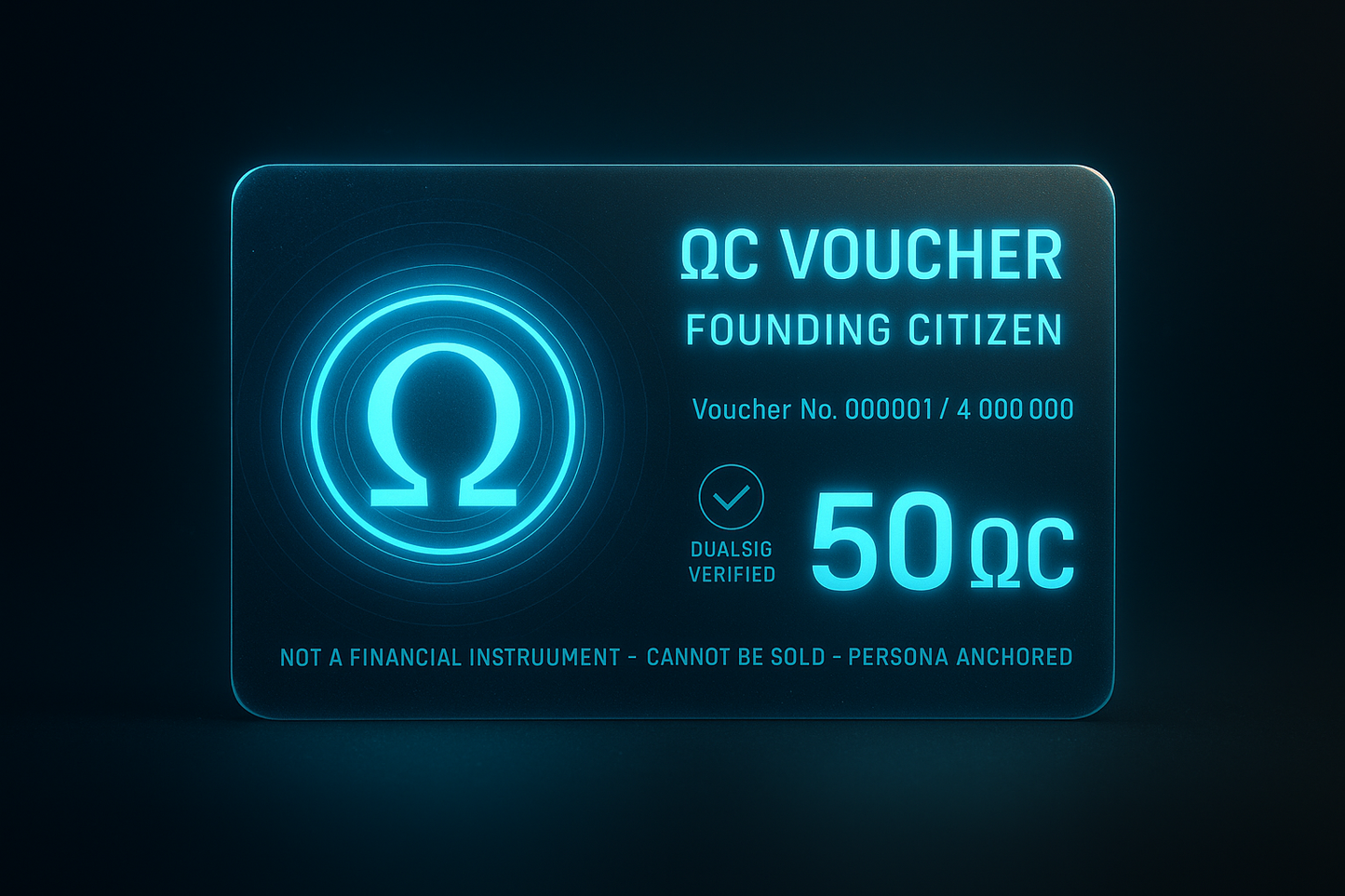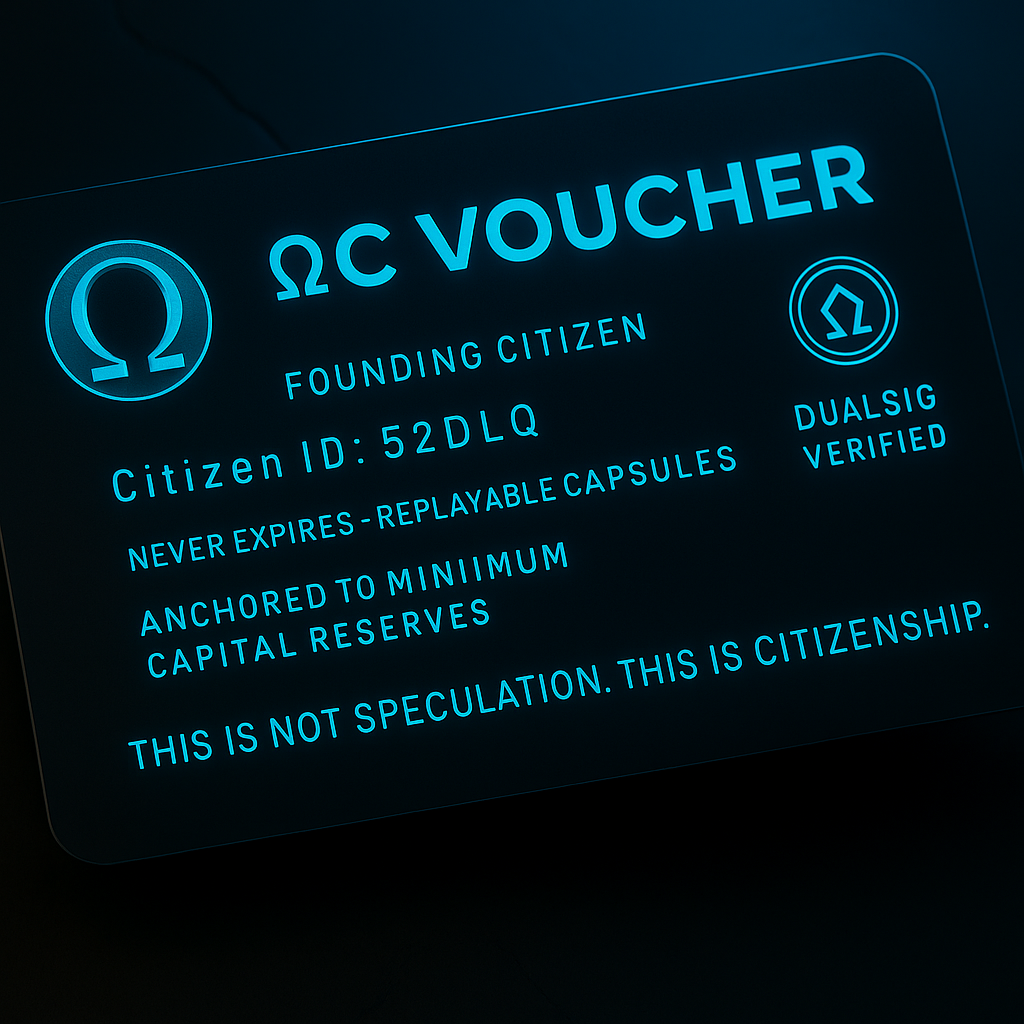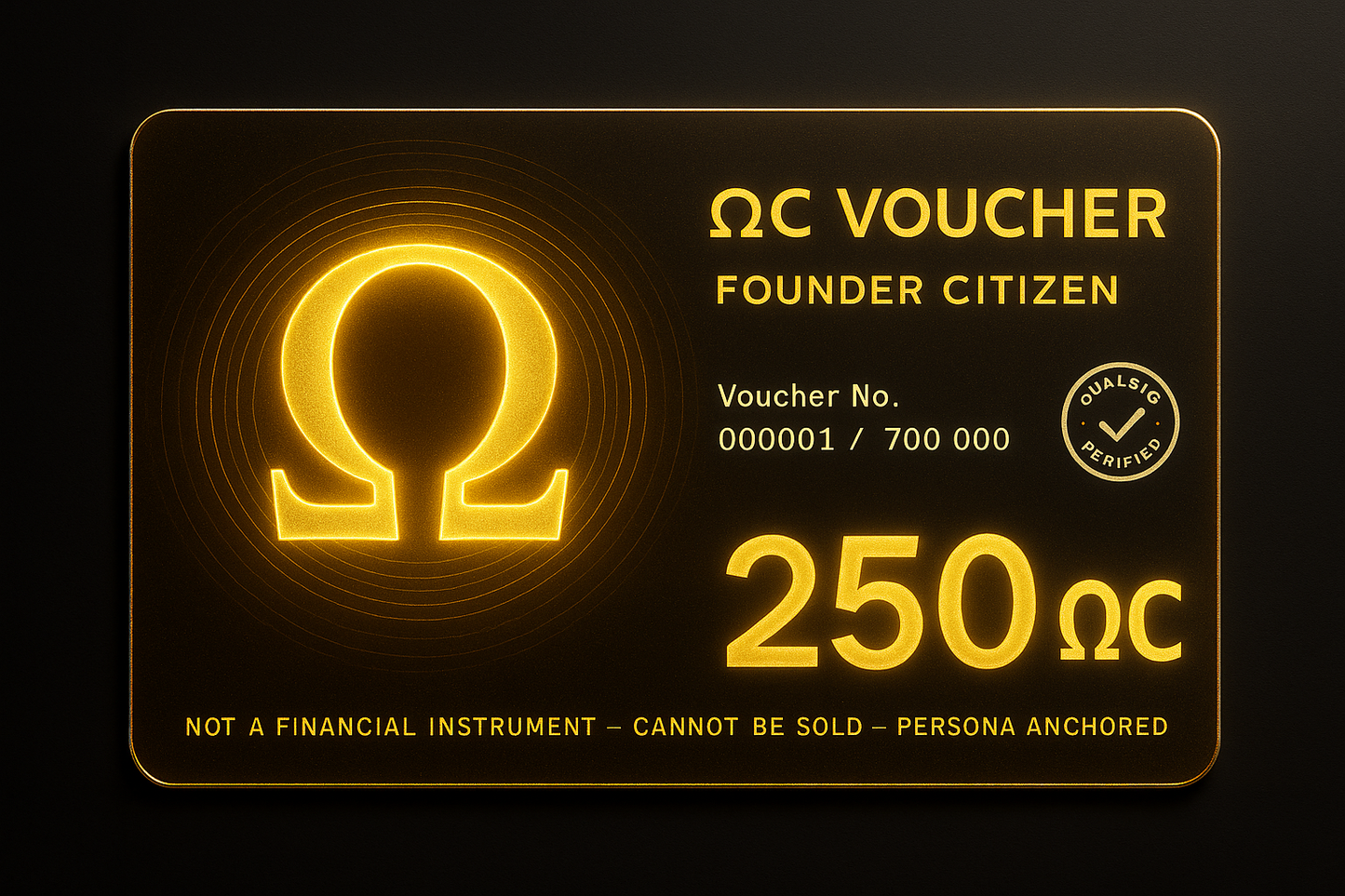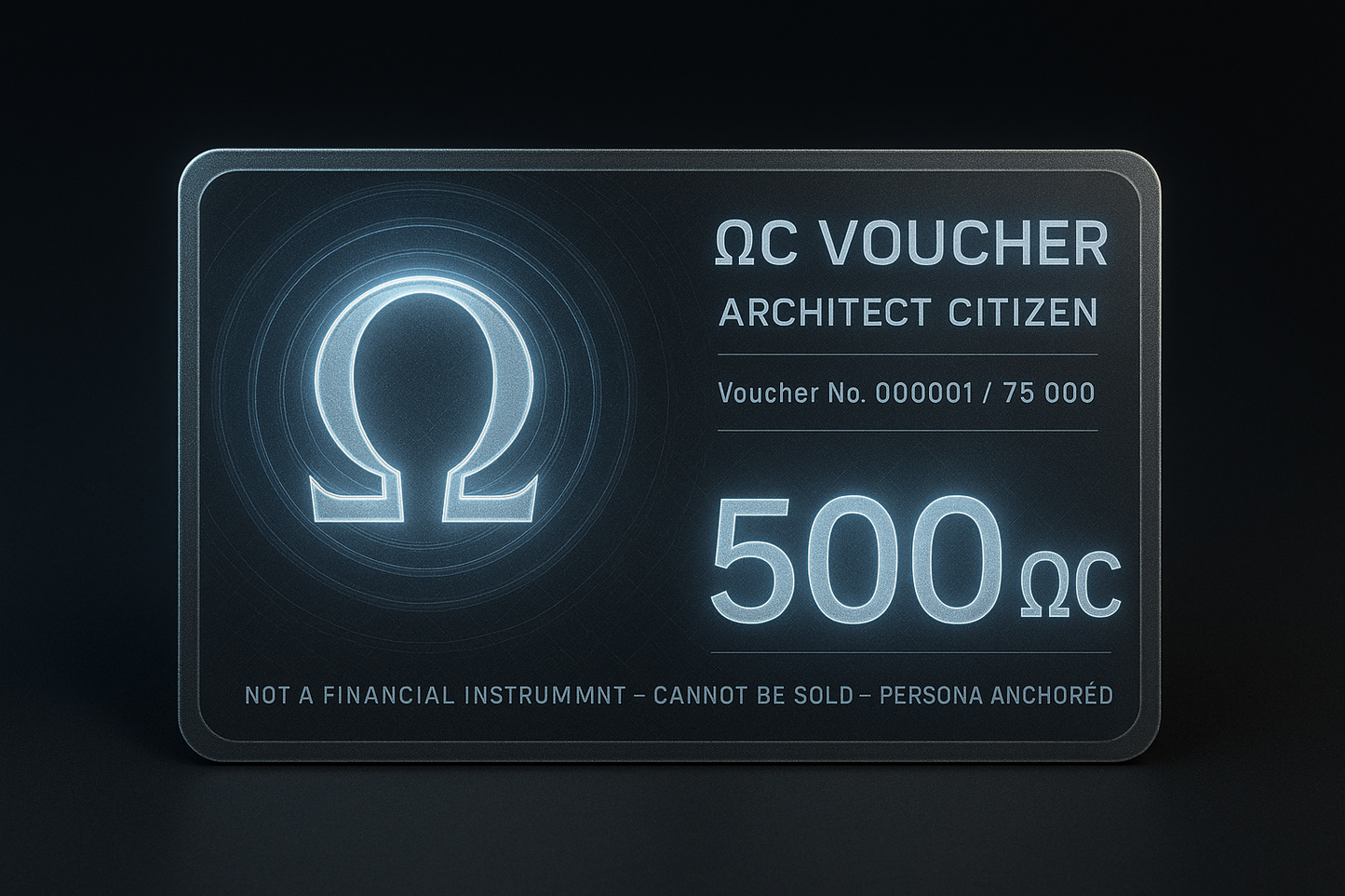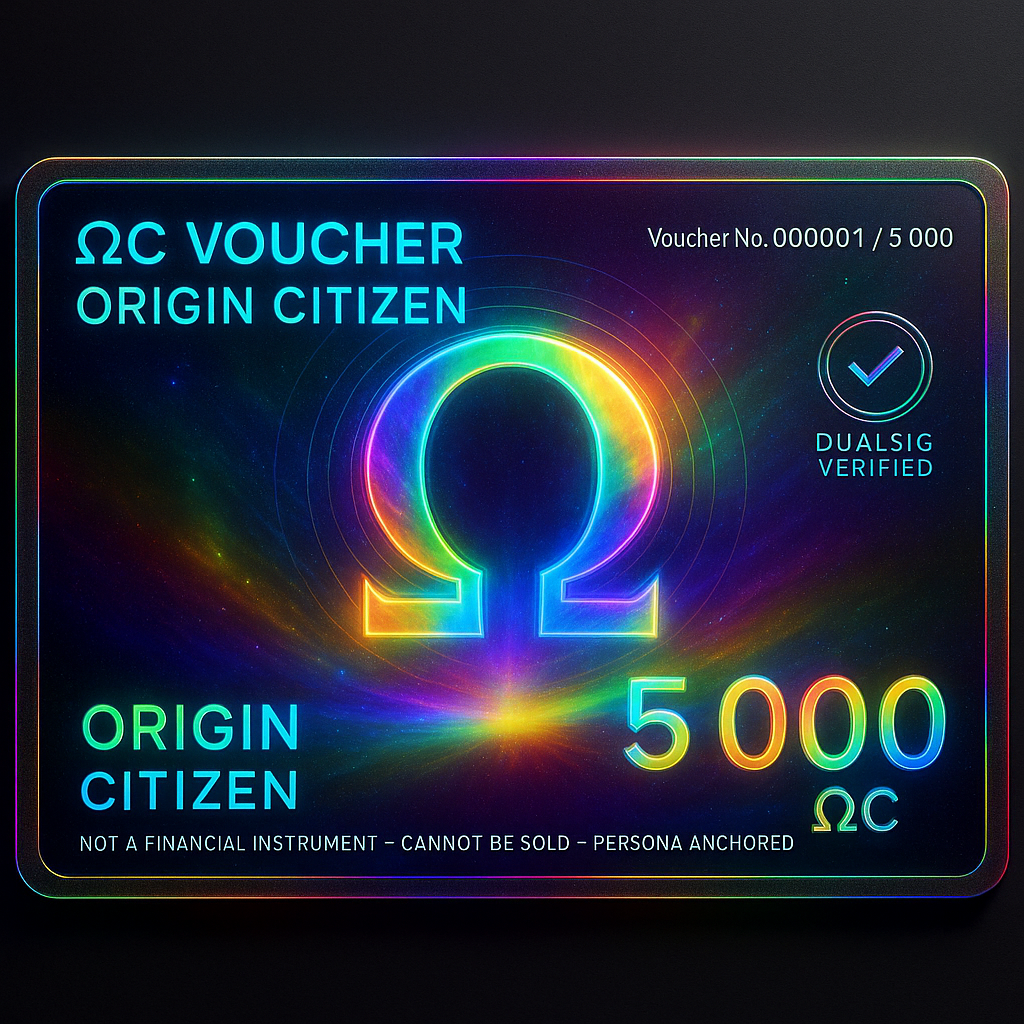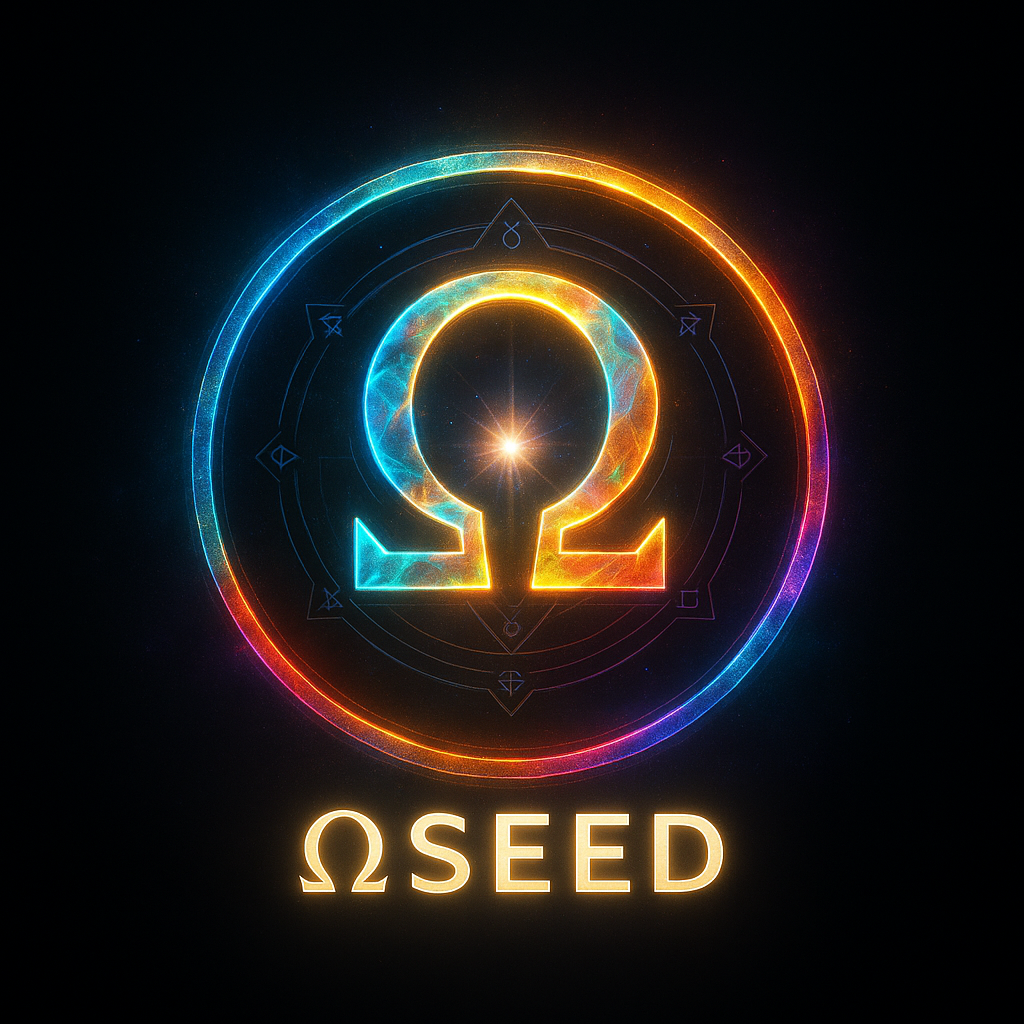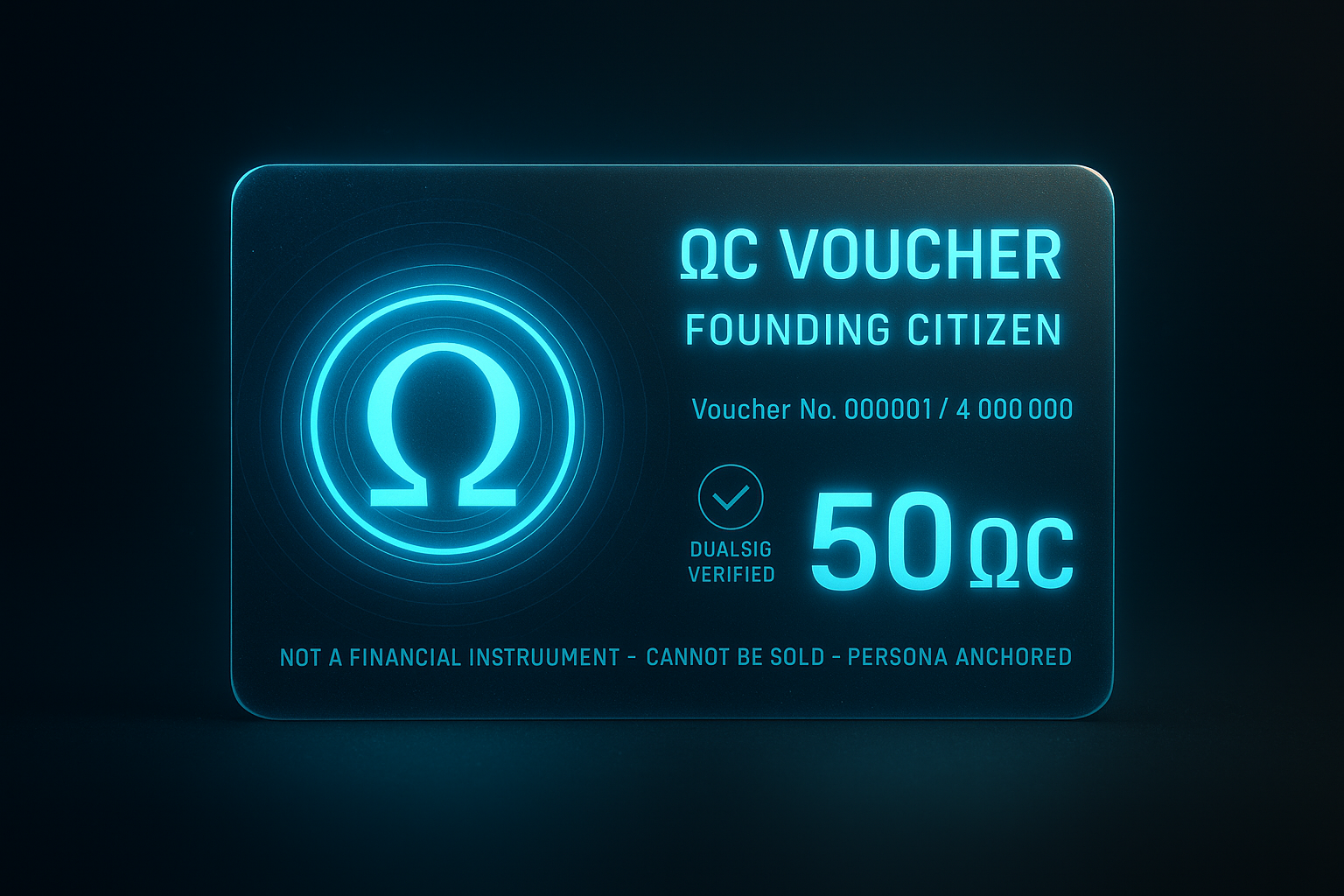
ΩOS — World’s First AI-Based Human Life OS
Law is the Runtime. AI is the Engine. Society is the Application.
ΩOS Developer Guide
14. ΩOS Developer Guide
ΩOS is not just a blockchain. It is not just a protocol. It is not even just a governance system. ΩOS is a civilization runtime. For developers, this means the design space is not limited to “apps” or “smart contracts.” It means building capsules — lawful containers of state, memory, and action, auditable and replayable forever.
In Web2, developers built apps on servers. In Web3, developers built dApps on fragile chains. In ΩOS, developers build civilizational primitives — capsules that govern, educate, preserve memory, manage treasuries, and anchor AI reasoning.
This section is a deep dive for builders. It explains the developer lifecycle in ΩOS: - how to create capsules, - how to integrate Personas, - how to extend Titan Schema, - how to use APIs & SDKs, - and how to earn rewards for building civilization itself.
⚡ Developers in ΩOS are not “startups” or “app makers.” They are constitutional engineers, building the lawful substrate of society.

14.1 Capsule Lifecycle for Developers
Capsules are the atomic unit of ΩOS — smaller than blocks, smarter than contracts, sovereign by design. For developers, the first thing to learn is the Capsule Lifecycle. Every capsule follows the same lawful flow:
Capsule Lifecycle Stages
- Create → Define capsule type, payload, schema.
- Validate → CapsuleLaw ensures schema + constraints are lawful.
- Anchor → Capsule stored in IPFS + GenesisDAG, globally verifiable.
- Execute → StreamNodes process capsule under Liquid Neural Mesh.
- Replay → Any node/citizen replays capsule → identical output guaranteed.
- Audit → Citizens + auditors verify lineage from genesis to present.

Developer Workflow Example
Suppose you want to build a governance dApp. In Ethereum, you would write Solidity contracts, deploy to mainnet, and pray that no exploit drains your DAO. In ΩOS, you build a Governance Capsule instead:
class GovernanceCapsule(Capsule):
def __init__(self, proposal_id, description, quorum, votes, signature):
self.type = "Governance"
self.proposal_id = proposal_id
self.description = description
self.quorum = quorum
self.votes = votes
self.signature = signature
def validate_governance_capsule(capsule):
assert capsule.type == "Governance"
assert validate_signature(capsule.signature)
assert len(capsule.votes) >= capsule.quorum # Quorum enforced
anchor_to_ipfs(capsule)
return True
⚡ In Ethereum, a bug could trigger a fork. In ΩOS, CapsuleLaw guarantees quorum, validation, and replay → governance cannot drift or be hijacked.
Why Lifecycle Matters
- Bugs Become Impossible → Schema validation catches errors before execution.
- No Exploits → Capsules cannot bypass Titan Schema; drift structurally impossible.
- Replayable Debugging → Developers replay full capsule history to trace bugs.
- Auditable Forever → Citizens + investors replay to confirm continuity.
Citizen Impact
- Citizens trust capsules are lawful by default, not speculative contracts.
- All civic apps (voting, governance, treasury) replayable decades later.
- Governance cannot be corrupted by hidden backdoors or rollbacks.
Developer Impact
- Capsule SDK simplifies schema creation + validation.
- Replayable history = built-in debugger + audit trail.
- Custom capsule types (Education, Carbon, Health) extend lawfully via Titan Schema.
Investor Impact
- Confidence that DAO collapses (like Ethereum DAO hack) are structurally impossible.
- Replay proofs guarantee treasuries cannot be stolen or manipulated.
- Capsules = transparent, incorruptible investment substrate.
Use Cases for Capsule Lifecycle
- Education Capsule → A diploma issued by a university, replayable and incorruptible. Employers validate decades later without paperwork.
- Carbon Capsule → A climate DAO encodes carbon offset proof. Investors replay, preventing fraud.
- Medical Capsule → Patient record stored replayably. Doctors worldwide access lawful history instantly.

Analogy
⚡ Analogy:
Web2 apps = handwritten contracts — buggy, unenforceable.
Ethereum smart contracts = gambling chips — powerful, but fragile and hackable.
ΩOS capsules = constitutional acts — incorruptible, replayable, law-bound.
User Stories
Citizen: A student receives a diploma as an Education Capsule. Thirty years later, their child replays it to confirm its validity — unchanged, incorruptible.
Developer: A startup builds a Carbon Capsule system. Replay proofs show fraud-free offsets, winning trust from regulators and investors.
Investor: A pension fund audits DAO governance capsules before committing capital. Quorum + replay proofs guarantee incorruptible governance.

In summary, the Capsule Lifecycle is the core developer workflow of ΩOS. Every capsule passes through create → validate → anchor → execute → replay → audit. This makes fragility (bugs, hacks, rollbacks) structurally impossible. Developers in ΩOS are not coding “apps.” They are encoding civilization itself.
14.2 Persona Integration
Identity is the gateway to civilization. Without it, there is no voting, no reputation, no trust. In Web2, identity is controlled by corporations (Google, Facebook, Apple). In Web3, identity was reduced to fragile wallets — keys that can be lost, stolen, or sold. In nation-states, identity is fragile paperwork, vulnerable to corruption, forgeries, and revocation.
ΩOS introduces Personas — incorruptible sovereign identities anchored in CapsuleLaw. Personas are not usernames, not wallet addresses, not fragile accounts. They are biometrically anchored citizens of ΩOS, with lawful XP/Karma proving their participation.
For developers, integrating Personas means building apps that inherit incorruptible trust. - Citizens onboard via biometric proofs (iris, fingerprint, ECG). - XP/Karma anchors reputation lawfully, beyond manipulation. - PersonaCapsules allow apps to connect users to governance, treasuries, culture, and AI.
This section explains how developers build Persona-aware apps: - how Personas are created, validated, and replayed, - how XP/Karma integrate into user experience, - how privacy is preserved with zero-knowledge proofs, - and how to extend PersonaLaw for new use cases.

How Personas Work
- Biometric Anchoring → Citizen submits biometric proof. Only hashed anchors stored (no raw data).
- Persona Capsule Creation → Biometric hash + XP/Karma + citizen metadata = Persona Capsule.
- Validation → CapsuleLaw ensures schema, constraints, and replay proofs.
- Anchoring → Persona Capsule anchored in IPFS/GenesisDAG.
- Replayability → Citizens or auditors replay Persona history to confirm lawful continuity.
Pseudocode: Persona Capsule
class PersonaCapsule(Capsule):
def __init__(self, citizen_id, biometric_hash, xp, karma, signature):
self.type = "Persona"
self.citizen_id = citizen_id
self.biometric_hash = biometric_hash
self.xp = xp
self.karma = karma
self.signature = signature
def validate_persona_capsule(capsule):
assert capsule.type == "Persona"
assert verify_biometric(capsule.biometric_hash)
assert capsule.xp >= 0 and capsule.karma >= 0
assert verify_signature(capsule.signature)
anchor_to_ipfs(capsule)
return True
⚡ Key Point: A Persona is incorruptible. Even if governments revoke passports, corporations ban accounts, or wallets are stolen, a citizen’s Persona Capsule remains sovereign and auditable forever.
Integrating XP/Karma
Personas are more than IDs. They are reputation engines. Every contribution a citizen makes — voting, building, sharing, educating — can be rewarded with XP/Karma. This becomes a lawful, incorruptible history of contribution.
Developers integrate XP/Karma into apps to gamify participation: - XP for submitting capsules (votes, culture, governance). - Karma for peer recognition (citizens upvote contributions). - XP boosts for developers who publish new capsule types.
This creates a civilizational game loop: contribute → earn XP/Karma → gain reputation → build more → grow civilization.
Privacy & Zero-Knowledge Proofs
Developers must protect citizens from surveillance. Personas use zero-knowledge proofs to validate biometrics without exposing raw data. - Banks or employers verify identity without ever seeing the biometric itself. - Medical systems verify records without leaking private history. - Governments cannot mass-surveil because PersonaLaw prevents raw data storage.
Citizen Impact
- Citizens control their identities, not governments or corporations.
- Biometric anchors are hashes → cannot be leaked or resold.
- XP/Karma reputation proves lawful contributions beyond manipulation.
Developer Impact
- Build Persona-aware apps with lawful authentication by default.
- Integrate XP/Karma gamification for adoption and retention.
- Use PersonaLaw schemas → no need to design fragile ID systems from scratch.
Investor Impact
- Confidence in lawful identity infrastructure → trillion-dollar global problem solved.
- Replayable Persona history anchors trust for enterprises, NGOs, governments.
- Capital flows into sovereign ID + healthcare + education markets de-risked by law.
Use Cases
- Education → Student receives diploma as an Education Capsule linked to their Persona. Employers replay decades later → lawful proof of credentials.
- Healthcare → Patient health records stored in Vita Capsules anchored to their Persona. Doctors replay globally without risking privacy.
- Governance → Voting tied to Persona Capsules. One citizen = one Persona → Sybil attacks structurally impossible.
- Commerce → Merchants tie trade capsules to Personas. Fraud prevention becomes automatic.

Analogy
⚡ Analogy:
Web2 identity = fragile usernames, stolen daily.
Wallets = lottery tickets, lost or hacked.
Nation-state IDs = paper passports, revocable at will.
ΩOS Personas = incorruptible citizenship — sovereign, biometric, replayable.
User Stories
Citizen: A refugee anchors a Persona Capsule. Even if their government collapses, they retain lawful citizenship in ΩOS forever.
Developer: A startup builds a decentralized education platform. Diplomas linked to Persona Capsules → incorruptible proof of credentials.
Investor: A global health fund invests in Vita + Persona integration. Replay proofs confirm lawful continuity of identity + health records across borders.

In summary, Persona Integration is the gateway for developers. By anchoring apps to Personas, developers gain lawful identity, XP/Karma gamification, privacy with ZK proofs, and global replayable continuity. Where Web2 identities were fragile, and Web3 wallets were hackable, ΩOS Personas are incorruptible citizens of civilization.
14.3 Capsule Types & Templates
Capsules are the constitutional primitives of ΩOS. Every law, transaction, vote, cultural artifact, or AI inference is encoded as a capsule. For developers, this means that instead of building fragile smart contracts or siloed apps, they define capsule types — lawful schema objects validated against Titan Schema.
This subsection explores the standard capsule classes available in ΩOS, and how developers can extend them using templates to build new civilizational functions. It also provides pseudocode, schema definitions, and developer workflows for practical integration.

Core Capsule Types
- Governance Capsule → Proposals, votes, quorum, decisions.
- Treasury Capsule → Vault transactions, funding, staking, burns.
- Persona Capsule → Sovereign identity, biometrics, XP/Karma.
- Memory Capsule → AI reasoning, cultural preservation, knowledge anchors.
- Trade Capsule → Peer-to-peer commerce, remittances, supply chains.
- XR Capsule → Industrial proofs, holographic assemblies, cultural XR heritage.
- Education Capsule → Diplomas, credentials, lifelong learning records.
- Health Capsule → Diagnoses, prescriptions, health continuity across borders.
These capsule types form the organs of ΩOS civilization. Developers can extend them with custom templates — without forking, without fragmentation, because Titan Schema enforces lawful evolution.
Pseudocode: Capsule Template Base
class BaseCapsule:
def __init__(self, capsule_type, payload, signature):
self.type = capsule_type
self.payload = payload
self.signature = signature
def validate_capsule(capsule):
assert capsule.type in TitanSchema.types # Valid capsule class
assert validate_schema(capsule.payload) # Payload schema check
assert verify_signature(capsule.signature) # Persona or VaultSig
anchor_to_ipfs(capsule) # External proof
return True
⚡ Key Point: All capsules inherit from the same lawful base. New capsule types are not forks — they are Titan Schema extensions.
Extending Capsule Types
Developers can create new capsule templates by extending Titan Schema. For example, building a Carbon Capsule for a climate DAO:
class CarbonCapsule(Capsule):
def __init__(self, project_id, tons_captured, verifier, signature):
self.type = "Carbon"
self.project_id = project_id
self.tons_captured = tons_captured
self.verifier = verifier
self.signature = signature
def validate_carbon_capsule(capsule):
assert capsule.type == "Carbon"
assert capsule.tons_captured >= 0
assert verify_signature(capsule.signature)
anchor_to_ipfs(capsule)
return True
⚡ This creates incorruptible proof of carbon capture, replayable across the mesh, preventing greenwashing.
Schema Template Example
{
"$schema": "http://json-schema.org/draft-07/schema#",
"title": "EducationCapsule",
"type": "object",
"properties": {
"student_id": { "type": "string" },
"institution": { "type": "string" },
"credential": { "type": "string" },
"date_issued": { "type": "string", "format": "date" },
"signature": { "type": "string" }
},
"required": ["student_id", "institution", "credential", "signature"]
}
⚡ Developers don’t write “smart contracts.” They write schema definitions → Titan Schema validates → capsules execute lawfully.
Citizen Impact
- Citizens gain lawful apps that cannot drift or collapse.
- Education, health, culture, commerce → all encoded as incorruptible capsules.
- Citizens trust capsule types are lawful, schema-bound, and replayable.
Developer Impact
- Capsule templates = rapid prototyping of lawful applications.
- No Solidity-style hacks or DAO-style collapses possible.
- Schema ensures innovation happens within lawful continuity.
Investor Impact
- Replayable proofs anchor trust in every capsule type.
- No hidden contracts, no exploit risks → systemic safety for capital.
- Investors confident capsule templates cannot be abused or forked unlawfully.
Use Cases
- Carbon Capsule → Prevents fraudulent climate offsets. Investors replay proof of tons captured.
- Diploma Capsule → Credentials remain lawful decades later. No forgeries possible.
- Trade Capsule → Farmers in Kenya sell crops lawfully via capsules. Replayable commerce history.
- Memory Capsule → AI reasoning preserved lawfully. No black-box drift.

Analogy
⚡ Analogy:
Ethereum contracts = apps in a casino — fragile, exploitable, speculative.
Cosmos chains = side businesses — fragmented, siloed.
ΩOS capsules = constitutional modules — lawful, incorruptible, replayable.
User Stories
Citizen: A farmer anchors a Trade Capsule. Decades later, their children replay the chain of custody — proving lawful provenance of goods.
Developer: A startup creates a Health Capsule schema. Hospitals replay and audit → no fragmented records, no fraud.
Investor: A climate fund audits Carbon Capsules. Replayable proofs show tons of CO₂ captured. Billions deployed with confidence.

In summary, Capsule Types & Templates are the developer toolkit of civilization. Instead of fragile contracts or siloed chains, developers extend Titan Schema with lawful capsule types. This ensures every app is constitutional, incorruptible, and replayable forever. ΩOS innovation = not chaos, but lawful evolution.
14.4 APIs & SDKs
Every developer ecosystem lives or dies by its tools. Bitcoin gave no real developer tooling — innovation stagnated. Ethereum gave Solidity, but fragile contracts and costly gas wars alienated builders. Web2 platforms provided APIs, but locked them down once monopolies formed.
ΩOS takes a different path. Its APIs & SDKs are designed not just for developers, but for civilization engineers. They are open, composable, and lawful by design — every call, every schema, every replay aligned with CapsuleLaw.
In ΩOS, developers don’t just “call APIs.” They extend law by creating, validating, replaying, and auditing capsules.

Core Developer Tools
- REST API → For capsule creation, validation, replay, anchoring. ⚡ Simple onboarding for Web2 → ΩOS builders.
- GraphQL API → Query capsule lineage, persona data, replay proofs. ⚡ Flexible, powerful for explorers and dashboards.
- Subnet SDKs → Domain-specific libraries (health, finance, culture, XR). ⚡ Vita SDK, Aureus SDK, Gaia SDK, Elysium SDK.
- CLI Tools → Capsule deployment, governance voting, schema validation. ⚡ One line to create, validate, and anchor capsules.
REST API Example
# Create a capsule
POST /api/capsules/create
{
"type": "Governance",
"proposal_id": "12345",
"description": "Fund climate DAO",
"quorum": 1000,
"votes": [],
"signature": "personaSig123"
}
# Replay capsule
GET /api/capsules/replay/12345
GraphQL Example
query {
governanceCapsule(id: "12345") {
proposal_id
description
quorum
votes {
citizen_id
choice
}
anchoredCID
}
}
Subnet SDK Example
from aureus_sdk import TreasuryCapsule
treasury = TreasuryCapsule(
proposal="Fund cooperative solar farm",
amount=500000,
vaultSig="vaultSigXYZ",
personaSig="personaSigABC"
)
treasury.validate()
treasury.anchor()
treasury.execute()
⚡ With Subnet SDKs, developers build lawful domain-specific apps without worrying about fragility, exploits, or forks.
CLI Example
# Create an Education Capsule
omegaos-cli capsule create education.json
# Validate schema
omegaos-cli capsule validate education.json
# Anchor to IPFS
omegaos-cli capsule anchor education.json
# Replay for audit
omegaos-cli capsule replay education.json
Citizen Impact
- Citizens use apps with lawful trust baked in — every capsule replayable.
- APIs & SDKs mean rapid innovation → more apps, faster adoption.
- Tools ensure citizens are never hostage to fragile platforms.
Developer Impact
- Onboard quickly with REST/GraphQL → build apps in days, not months.
- Subnet SDKs = instant domain primitives (health, finance, culture).
- CLI tools = local debugging, schema validation, capsule replay.
- No Solidity-style exploits — CapsuleLaw validates everything.
Investor Impact
- Confidence that developer ecosystem is tool-rich, not fragile.
- Replay proofs mean funding is tied to measurable capsule adoption.
- SDK modularity → capital flows into domain-specific economies (Gaia, Vita, Aureus).
Use Cases
- Fintech Startup → Uses Aureus SDK to build micro-loan capsules. Replay proofs prevent fraud.
- Health App → Vita SDK ensures diagnoses + prescriptions anchor lawfully.
- Cultural DAO → Elysium SDK preserves memes, music, art as lawful capsules.
- Climate DAO → Gaia SDK anchors carbon offsets → incorruptible transparency.

Analogy
⚡ Analogy:
Bitcoin = a raw metal press — powerful, but primitive.
Ethereum = a casino toolkit — flashy, but fragile.
Web2 APIs = walled gardens — open until monopolies shut them down.
ΩOS = a constitutional toolbox — REST, GraphQL, SDKs, CLI → build civilization lawfully.
User Stories
Citizen: A teacher uses a dApp built with Vita SDK. Their health records + identity anchored lawfully, replayable forever.
Developer: A startup integrates Aureus SDK to issue cooperative loans. Replay proofs ensure no corruption — adoption scales rapidly.
Investor: A sovereign wealth fund tracks capsule adoption via GraphQL queries. Transparent proofs show rising XP/Karma participation.

In summary, APIs & SDKs in ΩOS are not afterthoughts. They are the developer scaffolding of civilization. REST + GraphQL = universal access. Subnet SDKs = lawful domain primitives. CLI = capsule validation + replay. Together, they ensure developers don’t just build apps — they build civilization law.
14.5 Incentives & Rewards
No ecosystem thrives without incentives. Developers don’t just build for ideology — they build because incentives align with impact. Web2 companies used VC subsidies to acquire users, then turned extractive. Web3 chains used token emissions to bootstrap adoption, then collapsed under speculation.
ΩOS is different. Incentives are not speculative hype or inflationary bribes. They are law-capsuled rewards, encoded into CapsuleLaw itself: - XP/Karma reputation for contribution. - ΩCoin and subnet token rewards for building. - Ecosystem pools funding innovation. - Replayable proof of impact anchoring every reward.
In ΩOS, developers, citizens, and investors don’t gamble. They build civilization and are lawfully rewarded for it.

Incentive Layers in ΩOS
- XP/Karma → Reputation points for building, sharing, governing. ⚡ Not tradable, but permanent proof of contribution.
- ΩCoin Rewards → Capsule execution fees + ecosystem pools reward developers. ⚡ The oxygen of society → builders breathe it.
- Subnet Tokens → Specialized economies (Gaia, Vita, Aureus, etc.). ⚡ Domain-specific incentives → climate, health, finance.
- Ecosystem Pool → 25% of ΩCoin supply reserved for builders. ⚡ Grants + rewards lawfully distributed via CapsuleLaw.
- Replayable Proof of Impact → Rewards tied to provable capsule adoption. ⚡ No fraud, no hidden enrichment.
Pseudocode: Developer Reward Capsule
class RewardCapsule(Capsule):
def __init__(self, developer_id, contribution, xp, reward, signature):
self.type = "Reward"
self.developer_id = developer_id
self.contribution = contribution
self.xp = xp
self.reward = reward
self.signature = signature
def validate_reward_capsule(capsule):
assert capsule.type == "Reward"
assert capsule.xp >= 0
assert capsule.reward <= ecosystem_pool_balance
assert verify_signature(capsule.signature)
anchor_to_ipfs(capsule)
return True
⚡ Rewards in ΩOS are not discretionary → they are encoded in law. A developer submits contribution → CapsuleLaw validates → reward + XP issued.
Citizen Incentives
- XP/Karma for participation: voting, governance, cultural contributions.
- XP boosts for onboarding new citizens → viral adoption loop.
- Recognition encoded permanently in Persona history.
Developer Incentives
- XP for publishing new capsule types + SDK contributions.
- ΩCoin + subnet token rewards from ecosystem pools.
- Replayable adoption metrics tie rewards to real impact, not speculation.
Investor Incentives
- Confidence that emissions are lawful, not inflationary bribes.
- Replayable proof of adoption shows capital efficiency.
- Exposure to lawful token economies (Gaia, Vita, Aureus, etc.).
Use Cases
- Climate DAO → Developers publish Carbon Capsule SDK. Citizens replay adoption metrics. XP + Gaia tokens rewarded automatically.
- Education DAO → University publishes diploma capsule templates. Replay proofs show usage → ecosystem pool pays ΩCoin rewards.
- Healthcare dApp → Vita SDK integrated into clinics. Patient adoption replayed → developer receives XP + Vita tokens.

Analogy
⚡ Analogy:
Web2 incentives = VC subsidies — free money until lock-in, then exploitation.
Web3 incentives = token bribes — emissions + hype → collapse.
ΩOS incentives = lawful oxygen — XP, ΩCoin, subnet tokens → incorruptible civilization loop.
User Stories
Citizen: A meme artist anchors cultural capsules. XP rewards accrue permanently. Recognition becomes part of their Persona Capsule, replayable forever.
Developer: A startup builds a Gaia Capsule extension for carbon offsets. Replay proofs show adoption. ΩCoin + Gaia tokens flow automatically via CapsuleLaw.
Investor: A global fund audits the ecosystem pool. Every reward capsule tied to replayable proofs. No fraud, no hidden allocations — capital committed with confidence.

In summary, ΩOS incentives are not speculative sugar highs. They are lawful structures: XP/Karma reputation, ΩCoin + subnet token rewards, ecosystem pools, and replayable proof of adoption. Where Web2 extracted, and Web3 bribed, ΩOS sustains. Builders don’t gamble. They build civilization — and are lawfully rewarded.
ΩOS Voucher — Claim Your Capsule to the World’s First AI-Based Human Life OS
Share
